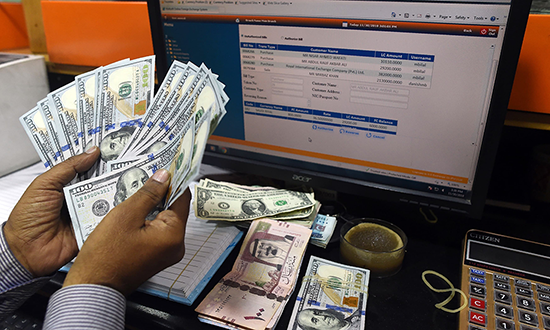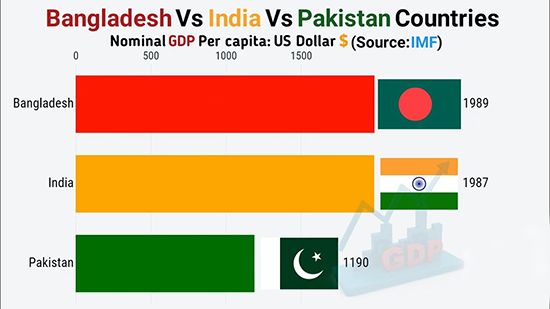Though all agree that the economy is a disaster, opinion is divided about who is responsible. Imran Khan supporters propagate that it was the corruption of the Sharifs and Zardari that reduced the state to poverty, whereas his opponents claim it was Imran’s bad and irresponsible government policies that took us to the brink of the precipice.
The recently released Annual Economic Survey confuses rather than clarifies those trying to evaluate recent economic performance. Imran’s supporters claim that the PTI policies succeeded in taking GDP growth up to 6%, agricultural growth up by 6%, exports up by 27% and remittances up by 7.6%. Anti-Imran analysts question the value of a survey that uses rebased numbers and even accuse government statisticians of using false numbers. They condemn the economic performance of the PTI government and point to the growth in inflation to double digits, the massive fall in the rupee exchange rate, the Current Account Deficit (CAD) which has risen from $0.5 billion to $15 billion due to the increase in imports by 44% from $50 billion to $72 billion, and the huge increase in government debt, both domestic and external.
When measured in rupees, the GDP shows growth, but when measured in dollars, the GDP shows contraction or negative growth. Double digit inflation and rising prices increase the burden on a population that grows by over 2.5% every year. Despite the claimed growth of the economy, hardship and poverty grow. A hypothetical nation with a population of 100 that produces 100 eggs a year, with eggs costing Rs1 each, has an egg-GDP of Rs100. If its population grows by 2%, egg production remains the same (100) and the price of eggs doubles to Rs2, egg-GDP has risen by 100% but each person in the country gets to eat less eggs which are more expensive to buy. Should we celebrate the rising egg-GDP or feel the pain of eating less eggs that cost more? When you factor in the rising cost of petrol, gas, electricity, edible oil, all imported commodities and even basic everyday items that are produced at home you have an economy that is both growing in rupees while contracting in dollars, as the poor are reduced to starvation, the middle classes forced to tighten their belts, and capitalists see their wealth erode in real or dollar terms. The GDP keeps rising in rupees, but the real per capita income keeps falling. This is what has happened to Pakistan.
The PTI government did not try to create prosperity. Imran Khan was more concerned with wooing the voters than building the economy
The PTI government did not try to create prosperity. Imran Khan was more concerned with wooing the voters than building the economy. The hundreds of billions of rupees that were given to the EHSAAS programme and the massive subsidies in every part of the economy resulted in shortage of money for education, health, and infrastructure and even funds to pay our contractual obligations such as payment to the Chinese power plants for electricity supplied. This culminated in the unsustainable blunder of dropping the price of petrol, gas, and electricity after the Ukraine war when energy prices around the world were rising by leaps and bounds. Pakistan continued to buy oil and gas at fast rising prices and sell at a loss to voters despite the fact that there was no money to pay the bill. This resulted not only in the hemorrhaging of funds that Pakistan did not have and could not afford, but also in the suspension of the IMF programme without which the Pakistan economy could not survive.

Shehbaz Sharif, the new prime minister, had a track record of achievement in Punjab, but was caught in the dilemma of raising petrol and electricity prices in a pre-election year, while Imran Khan used his huge jalsas and jalooses to demand immediate elections. After Shehbaz had secured his right to rule till the end of the term allowed by the Constitution, he risked the unpopular raising of energy prices. Miftah Ismail, bowing down to necessity, announced a budget aimed more at satisfying the IMF rather than Pakistani voters or investors. At best the budget will buy time but will do little to address the basic issues.
The most important steps to build the economy are to control the population, reform the bureaucracy to serve rather than oppress the people, promote pro-private sector policies that make it safe and profitable to invest, improve the quality of the workforce, increase agricultural productivity through better use of land and water, privatize loss making state owned enterprises, reduce the dollar deficit by attracting FDI, to increase exports and reduce imports, and to reduce fiscal deficits by giving taxpayers a better reason to pay their taxes.
Bangladesh, whose economy is beating both India and Pakistan, explains its success, saying ‘This is what can be achieved when you have kids in school, women in the workforce, faujis in their barracks, and Mullahs in their Masjids’. In Pakistan, the economy is given a secondary position to the three priorities of democracy, security, and Islam.
Democracy in the West is government by rule of law, with elections every few years to select and give legitimacy to those who are to govern. The rich countries of the West use democracy to decide on how to divide the economic pie but in bankrupt countries there is no pie to divide. Democracy in Pakistan lacks the rule of law, but has regular elections in which money, power, and false promises determine the results. Uninformed, poverty stricken voters demand what the nation cannot afford to give and it is they who decide who will win. More often than not, they make the wrong decision. Governments avoid the risk of reform and change, and retain the loyalties of their voters by giving subsidies supported by loose monetary policy and ever growing debt. Pakistanis believe strongly in spending more than they earn. The policies advocated by the IMF and adopted by the Shehbaz Sharif government may take the economy out of the danger zone but the cost will be inflation and austerity, a price that the voters are not happy to pay. In the coming election Imran will blame the current government for the hard times, but any beneficial consequences will accrue to the post-election regime. Reform and economic reconstruction seem unlikely, either before or after the election.
Pakistan needs to be kept safe from both internal and external threats. Security is the responsibility of the armed forces and Pakistan has one of the largest military establishments in the world. This costs money and after debt servicing, expenditure on the military consumes the largest share of state expenditures. We need to explore whether the combination of our nuclear capability, our relationship with China, and more effective diplomacy can enable a reduction in military expenditure. High military expenditure may have been a necessary burden on our economy but it has held back development. Domestic instability has been a serious problem, with Balochistan and Islamist parties being a constant cause of concern that have held back Direct Foreign Investment. The attacks on Chinese workers in Balochistan have had a negative impact on the CPEC projects. Until our security establishment can effectively reduce threat to an acceptable cost, a strong economy will remain a mirage. Some argue that the Baloch problem could be better handled by spending less on security and more on the Baloch. Stability in Balochistan would open up Reko Diq and many other such opportunities.
At the birth of Pakistan, it was assumed that Islam would be a uniting factor, now it is becoming a divisive factor. Throughout history, education has flourished under Islam and the great Islamic empires flourished due to education. In Pakistan today, Islam swims in a sea of illiteracy which seems to grow year after year. The killing of a Sri Lankan manager accused of blasphemy was a shameful incident. The recent violence in Karachi against Samsung, also attributed to blasphemy, can prove a disaster for our exports. Samsung’s factories in Vietnam contribute more than $50 billion a year to Vietnam’s exports. The company controls a quarter of Pakistan’s domestic market for cellphones, their entry into production in Pakistan is a golden opportunity that we cannot afford to squander.

Though Islam promotes the private sector and the Prophet (PBUH) was himself a successful businessman, Pakistan under Bhutto attacked the business community and nationalised industry, finance, and even trade. Though the experiment was a disaster, the large state-owned enterprises remain a black mark that continues to drain our economy due to their endless losses. Pakistan was determined to ignore the Muslim countries with successful economies, such as Malaysia, Turkey, and Indonesia, who encouraged and supported the partnership between the private sector and the state. Successive governments in Pakistan explained their antagonism to big business as an aversion to corruption. Though it is certainly true that important business groups looked after bureaucrats and politicians to facilitate their growth, it is no less true that today in Pakistan they have to pay protection money merely to remove obstructions and attacks. The result is a reduction in investment, the flight of capital, and an unending brain drain. Daim Zainuddin, the famous Malaysian finance minister called a meeting of prominent businessmen and told them, ‘I (the state) am a partner in all your enterprises, 25% of all your profits comes to me in taxes. Come to me with your problems and I will help your profits grow.’
In Pakistan, the economy is given a secondary position to the three priorities of democracy, security, and Islam
Pakistan and the UAE share a common religion but have very different values and attitudes. Pakistan banns alcohol which boosts smuggling profits, but Dubai Airport greets arrivals with a well-stocked liquor shop which despite being duty-free is not cheap. Dubai profits from the trade, Pakistan does not. Emirates Airlines is one of the world’s most successful airlines, PIA is a dismal failure. Both Dubai and Karachi were small towns which earned their living from fishing and trade. Karachi is considered one of the world’s worst cities to live in, Dubai is an international Shangri-la and tourist destination to the world. When Beirut fell victim to war and destabilisation, Bhutto said he would turn Karachi into Beirut, but Karachi only took war and instability from Beirut whereas Dubai took the tourism, finance and glamour. Why are countries all around us so successful whereas we are a mess? The answer lies in our values and attitudes. Dubai knew where it was going, we keep changing our mind. We are like Alice in Wonderland when she asked the Cheshire Cat:
Alice: Would you please tell me which way I ought to go from here?
Cat: That depends a good deal where you want to get to?
Alice: I don’t much care where.
Cat: Then it doesn’t matter which way you go’
Alice: So long as I get somewhere.
Cat: O you’re sure to do that, if only you walk long enough.
With the election expected in 2023, some hope for Imran Khan to put things right while others believe the Shehbaz Sharif and his coalition will provide the solution. The sad reality is that Pakistan’s slide will continue whichever of these two outcomes the election will produce. Our system of parliamentary democracy flawed by populism, false promises, compromises and deceit cannot take us out of chaos and crisis. Hard decisions, disciplined implementation, and rebuilding of national character, values and attitudes requires a period of authoritarian government that combines authority with technical capability. It is not individuals but the system itself that is to blame. If we continue in the same way, we will get the same results. If we want different results we must try a different way.
In 1947 the new state of Pakistan was born amidst high hopes. In 1971 Pakistan was shattered as Bangladesh broke away. By 2022, Pakistan is bankrupt and falling into chaos and increasing street violence, disrupted by politics and divided by religion, ethnicity, and class, as the gap between the privileged and the deprived grows. Will Pakistan live to see a hundred years as a state characterised by illiteracy, injustice, indiscipline, and an ever-growing population desperate to escape from the clutches of predatory government, unable to attract investment from the world, which preys on its own people?



